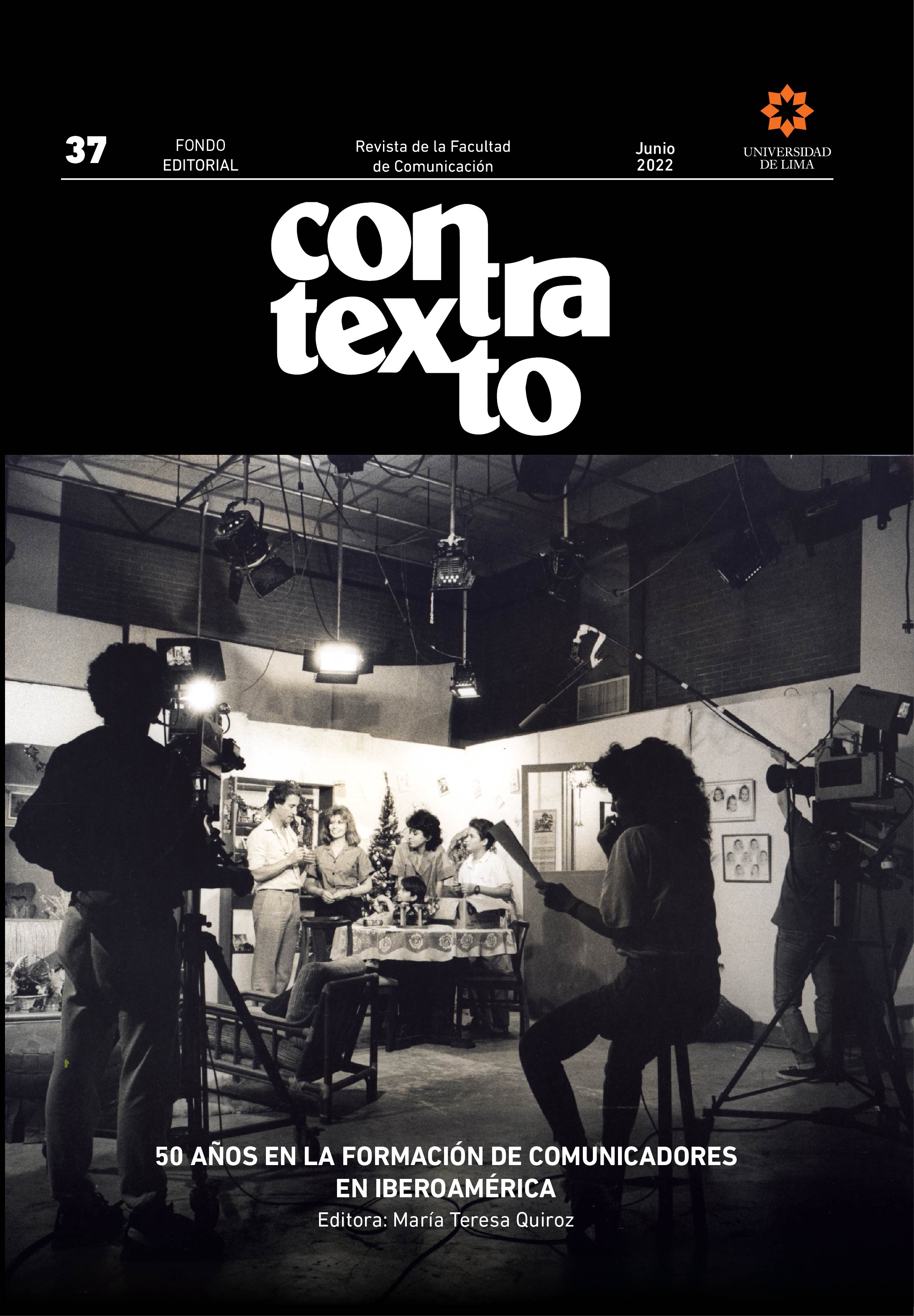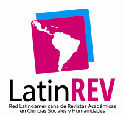Entrenar al algoritmo: gobernanza, agencia y literacidad en el uso de YouTube
DOI:
https://doi.org/10.26439/contratexto2022.n037.5331Palabras clave:
YouTube, Algoritmos, Usuarios, alfabetización digital, literacidad transmediaResumen
Este estudio aborda las experiencias de jóvenes usuarios mexicanos con los algoritmos de recomendación de la plataforma YouTube. Busca determinar si se encuentran subordinados a la gobernanza algorítmica o si, por el contrario, son capaces de desarrollar algunas tácticas para resistir las lógicas del poder algorítmico a través de su propia agencia. Utiliza una metodología cualitativa centrada en grupos de enfoque. Evidencia que los usuarios no se subordinan completamente a las plataformas, y que sus posibilidades de agenciamiento varían en función de sus diferentes modos de apropiación tecnológica, las teorías intuitivas acerca de su funcionamiento, la capacidad para evadir las distorsiones algorítmicas, y los recursos para evaluar la calidad de la información ofertada. Como resultado del análisis, se han identificado las habilidades específicas que constituyen la literacidad algorítmica.
Descargas
Referencias
Alvarado, O., Heuer, H., Vanden Abeele, V., Breiter, A., & Verbert, K. (2020). Middle-aged video consumers’ beliefs about algorithmic recommendations on YouTube. Proceedings of the ACM on Human-Computer Interaction, 4(CSCW2), artículo 121. https://doi.org/10.1145/3415192
Alvarado, O., & Waern, A. (2018). Towards algorithmic experience: initial efforts for social media contexts. En Proceedings of the 2018 CHI Conference on Human Factors in Computing Systems (pp. 1-12). Association for Computing Machinery. https://doi.org/10.1145/3173574.3173860
Bell, S., & Morse, S. (2013). How people use rich pictures to help them think and act. Systemic Practice and Action Research, 26(4), 331-348. https://doi.org/10.1007/s11213-012-9236-x
Bishop, S. (2019). Managing visibility on YouTube through algorithmic gossip. New Media & Society, 21(11-12), 2589-2606. https://doi.org/10.1177/1461444819854731
Bruns, A. (2008). The future is user-led: the path towards widespread produsage. Fibreculture Journal, 11. http://eleven.fibreculturejournal.org/fcj-066-the-future-is-user-led-the-path-towards-widespread-produsage/
Bucher, T. (2018). If… Then: algorithmic power and politics. Oxford University Press.
Burgess, J., & Green, J. (2018). YouTube. Online video and participatory culture. Polity Press.
César, A. (2017, 25 de octubre). Cada minuto suben 8 horas de video a YouTube en México. El Financiero. https://www.elfinanciero.com.mx/tech/cada-minuto-suben-horas-de-video-a-youtube-en-mexico/
Croucher, S. M., & Cronn-Mills, D. (2018). Understanding communication research methods (2.a ed.). Routledge.
Cruz Sánchez, I. (2019). Literacidad transmedial. Habilidades para vivir en el siglo XXI. En L. M. Garay Cruz & D. Hernández Gutiérrez (Coords.), Alfabetizaciones digitales críticas (pp. 105-128). Universidad Autónoma Metropolitana Unidad Lerma; Juan Pablos Editor.
Danaher, J., Hogan, M. J., Noone, C., Kennedy, R., Behan, A., De Paor, A., Felzmann, H., Haklay, M., Khoo, S.-M., Morison, J., Murphy, M. H., O’Brolchain, N., Schafer, B., & Shankar, K. (2017). Algorithmic governance: developing a research agenda through the power of collective intelligence. Big Data & Society, 4(2). https://doi.org/10.1177/2053951717726554
Dourish, P. (2016). Algorithms and their others: algorithmic culture in context. Big Data & Society, 3(2). https://doi.org/10.1177/2053951716665128
Garay Cruz, L. M., & Hernández Gutiérrez, D. (2019). Introducción. En L. M. Garay Cruz & D. Hernández Gutiérrez (Coords.), Alfabetizaciones digitales críticas (pp. 9-21). Universidad Autónoma Metropolitana Unidad Lerma; Juan Pablos Editor.
Gelman, S. A., & Legare, C. H. (2011). Concepts and folk theories. Annual Review of Anthropology, 40(1), 379-398. https://doi.org/10.1146/annurev-anthro-081309-145822
Gillespie, T. (2014). The relevance of algorithms. En T. Gillespie, P. J. Boczkowski & K. A. Foot (Eds.), Media technologies: essays on communication, materiality, and society (pp. 167-193). MIT Press.
Hernández y Hernández, D., Salado Rodríguez, L., & López González, R. (2019). Reflexiones sobre la literacidad: un punto de partida hacia lo digital. En L. M. Garay Cruz & D. Hernández Gutiérrez (Coords.), Alfabetizaciones digitales críticas (pp. 25-48). Universidad Autónoma Metropolitana Unidad Lerma; Juan Pablos Editor.
Hine, C. (2015). Ethnography for the Internet. Embedded, embodied and everyday. Bloomsbury Academic.
Kaiser, J., & Rauchfleisch, A. (2020). Birds of a feather get recommended together: algorithmic homophily in YouTube’s channel recommendations in the United States and Germany. Social Media + Society, 6(4). https://doi.org/10.1177/2056305120969914
Kearns, M., & Roth, A. (2019). The ethical algorithm. The science of socially aware algorithm design. Oxford University Press.
Kitchin, R. (2017). Thinking critically about and researching algorithms. Information, Communication & Society, 20(1), 14-29. https://doi.org/10.1080/1369118X.2016.1154087
Lugo Rodríguez, N. L. (2016). Diseño de narrativas transmedia para la transalfabetización [Tesis doctoral, Universitat Pompeu Fabra]. TDX. http://hdl.handle.net/10803/396131
Lukoff, K., Lyngs, U., Zade, H., Liao, J. V., Choi, J., Fan, K., Munson, S. A., & Hiniker, A. (2021). How the design of YouTube influences user sense of agency. En Proceedings of the 2021 CHI Conference on Human Factors in Computing Systems (pp. 1-17). https://doi.org/10.1145/3411764.3445467
Pariser, E. (2014). The filter bubble. How the new personalized web is changing what we read and how we think. Penguin Books.
Pasquale, P. (2016). The black box society. The secret algorithms that control money and information. Harvard University Press.
Pinch, T., & Bijker, W. (1989). The social construction of facts and artifacts: or how the sociology of science and sociology of technology might benefit each other. En W. E. Bijker, T. P. Hughes & T. Pinch (Eds.), The social construction of technological systems (pp. 17-30). MIT Press.
Ridley, M., & Pawlick-Potts, D. (2021). Algorithmic literacy and the role for libraries. Information Technology and Libraries, 40(2). https://doi.org/10.6017/ital.v40i2.12963
Rieder, B. (2020). Engines of order. Amsterdam University Press.
Rieder, B., Matamoros-Fernández, A., & Coromina, Ò. (2018). From ranking algorithms to ‘ranking cultures’: investigating the modulation of visibility in YouTube search results. Convergence, 24(1), 50-68. https://doi.org/10.1177/1354856517736982
Roberge, J., & Seyfert, R. (2018). What are algorithmic cultures? En R. Seyfert & J. Roberge (Eds.), Algorithmic cultures. Essays on meaning, performance and new technologies (pp. 13-37). Routledge. https://doi.org/10.4324/9781315658698-7
Scolari, C. (2016). Estrategias de aprendizaje informal y competencias mediáticas en la nueva ecología de la comunicación. Revista Telos, 103. https://telos.fundaciontelefonica.com/archivo/numero103/estrategias-de-aprendizaje-informal-y-competencias-mediaticas-en-la-nueva-ecologia-de-la-comunicacion/
Seaver, N. (2017). Algorithms as culture: some tactics for the ethnography of algorithmic systems. Big Data & Society, 4(2). https://doi.org/10.1177/2053951717738104
Siles, I., Segura-Castillo, A., Solís, R., & Sancho, M. (2020). Folk theories of algorithmic recommendations on Spotify: enacting data assemblages in the global South. Big Data & Society, 7(1). https://doi.org/10.1177/2053951720923377
Silge J., & Robinson D. (2016). tidytext: Text mining and analysis using tidy data principles in R. Journal of Open Source Software, 1(3), 37. DOI: 10.21105/joss.00037
Statista. (2021). YouTube penetration in selected countries and territories 2021. https://www.statista.com/statistics/1219589/youtube-penetration-worldwide-by-country/
Striphas, T. (2015). Algorithmic culture. European Journal of Cultural Studies, 18(4-5), 395-412. https://doi.org/10.1177/1367549415577392
Treré, E. (2019). Hybrid media activism. Ecologies, imaginaries, algorithms. Routledge.
Tufekci, Z. (2018, 10 de marzo). YouTube, the great radicalizer. The New York Times. https://www.nytimes.com/2018/03/10/opinion/sunday/youtube-politics-radical.html
Vega, F. (2021). El Estado de social media en América Latina. Comscore. https://www.comscore.com/lat/Prensa-y-Eventos/Presentaciones-y-libros-blancos/2021/El-Estado-de-Social-Media-en-America-Latina
Velkova, J., & Kaun, A. (2021). Algorithmic resistance: media practices and the politics of repair. Information, Communication & Society, 24(4), 523-540. https://doi.org/10.1080/1369118X.2019.1657162
We Are Social. (2020, 30 de enero). Digital 2020: el uso de las redes sociales abarca casi la mitad de la población mundial. https://wearesocial.com/digital-2020
YT Brandcast México. (2020, 23 de noviembre). YouTube Brandcast 2020 México [Video]. YouTube. https://www.youtube.com/watch?v=-xNbuFnpPbA
Descargas
Publicado
Número
Sección
Licencia
Todos los trabajos publicados están sujetos a una licencia CC BY 4.0 Creative Commons (actualizado el 1 de marzo de 2021).
El contenido de la revista se puede compartir en cualquier material o formato. Asimismo, se puede adaptar, contribuir y transformar. Ambas posibilidades sólo están permitidas en la medida en que cumplan las siguientes condiciones:
- Atribución: Se debe otorgar crédito donde sea debido, proporcionar un enlace a la licencia e indicar los cambios en caso se realice alguno. Esto debe hacerse de la manera que se considere apropiada, sin sugerir que el licenciante lo promueva a usted o su uso del material.
Derechos de propiedad
Los derechos patrimoniales de Contratexto se publican bajo una licencia Creative Commons BY 4.0, lo que permite a los autores mantener los derechos patrimoniales de su obra sin restricciones.
Si un trabajo publicado en Contratexto fuera copiado, distribuido, difundido o cualquier otra actividad contemplada en la licencia antes mencionada, se deberá mencionar de manera visible y expresa al autor o autores y a la revista.
Auto-archivo
Esta revista permite y anima a los autores/as a publicar artículos enviados a la revista en sus sitios web personales o en depósitos institucionales, tanto antes como después de su publicación en esta revista, siempre y cuando proporcionen información bibliográfica que acredite, si procede, su publicación en ella.






















